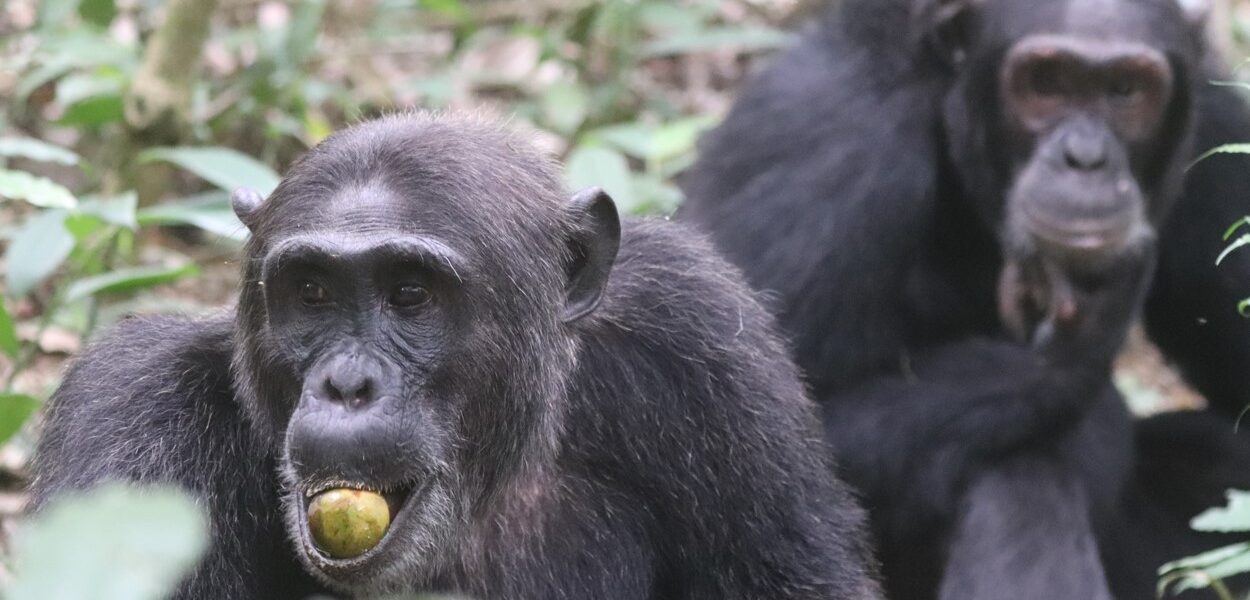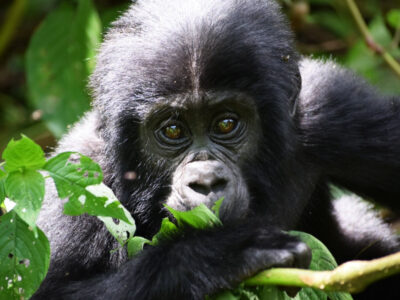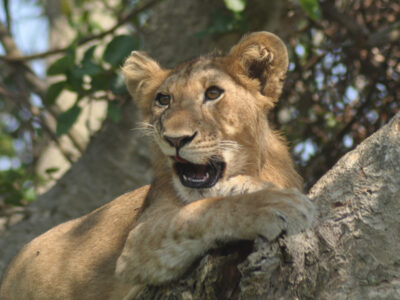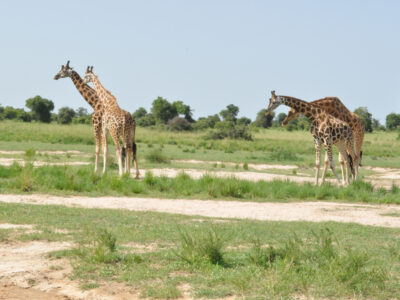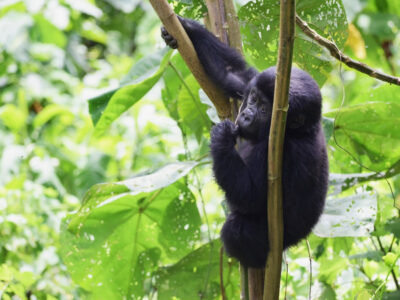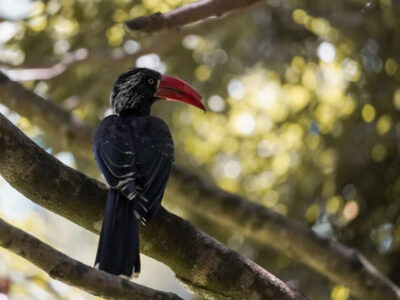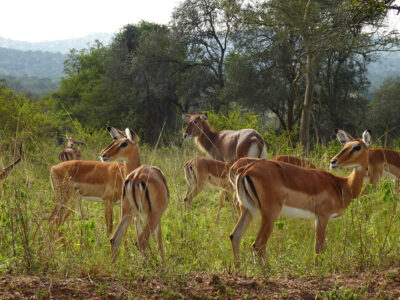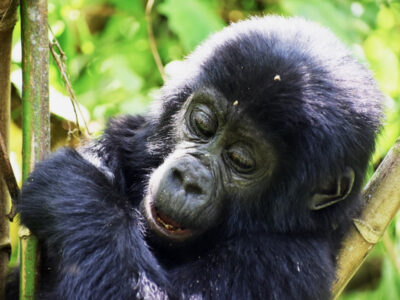Kibale National Park, located in Uganda, holds significant conservation importance for both the local community and the broader ecosystem. Kibale National Park is known for its biodiversity, that includes the largest population of Chimpanzees in Africa. The forest also harbors other 12 primate species some including L’Hoest’s monkey, red-Colobus monkey, black and white Colobus monkey, blue monkey, grey-cheeked Mangabey, baboons, Vervet monkey, red-tailed monkey, and many others. Apart from primate species, the park populates other birds over 300 species, various butterfly species, a variety of tree species for both medicinal and research purposes, and also different plant species. The conservation effort in the park enables the protection of these species and their habitats.
The surrounding communities around Kibale National Park have a deep cultural connection to the land and its wildlife. Through conserving the park, the cultural heritage of these communities can be preserved and passed to future generations
Uganda Wildlife Authority (UWA), the country’s top conservation agency, reiterated the importance of the people who live amid the country’s rare wildlife species. These people, who live near the country’s protected areas, are often described as Uganda Wildlife Authority’s biggest partners.
Conservation of resources is often related to restrictions. Kibale National Park is one of the most tourist attractions in Uganda often known as the “swiz of Africa”. It benefits the country and the nearby community economically by creating jobs for the people as rangers, guides, staff lodges, and other related activities. In other words, the generated revenue from the tourism activities carried out at the park can be invested again into developing community projects and infrastructure.
Kibale National Park provides significant environmental services like water regulation and conservation of the soil which benefit the region and the surrounding communities. This helps to prevent soil erosion and also control climate patterns which are very important for agriculture.
Kibale National Park and Kibale Forest serve as a room for research and study purposes. Researchers can study primates, biodiversity tropical ecology, and more conservation. The community can gain through these programs and partnerships by acquiring knowledge and participating in environmental research projects. The effective use of Kibale forest resources and the conservation importance lies in the ability to support livelihoods and protect the park’s biodiversity. To guarantee that these significance are experienced now as well as in the future, the resources must be managed effectively.
Chimpanzee Conservation and the Communities
Kibale National Park and its entire management have implemented various initiatives to conserve chimpanzees and also support the communities surrounding the park.
Frontline communities living adjacent to Kibale National Park in western Uganda have received funds from the Arcus Foundation. This is intended to sponsor the projects of over 2000 entrepreneurs around the park and preserve wildlife species the park has. Kibale National Park inhabits over 13 primate species, 300 birds, antelopes, and forest elephants. These funds will help in the removal of animal snares set in the parks and also expand the poverty alleviation projects. In doing so, more communities will be reached out and their lives will improve as well as chimpanzees and their habitats.
Without opportunities to earn sustainable incomes, households living in extreme poverty near the park have often relied on illegal hunting and logging to provide for their families. To draw such people away from these destructive ventures, Village Enterprise works to equip these communities with training, start-up funding, and ongoing business mentoring to launch businesses that do not harm vital ecosystems in and around Kibale National Park.
The park management conducts educational programs and outreach activities to raise awareness about conservation issues and promote environmental stewardship among local communities. These initiatives may include community workshops, and public events aimed at fostering a sense of environmental responsibility and encouraging sustainable practices.
Kibale National Park has established community-based conservation programs that involve local people in conservation efforts. These programs often include initiatives such as sustainable agriculture practices, alternative livelihood projects, and natural resource management training. By involving communities in conservation, the park management fosters a sense of ownership and encourages local support for conservation efforts.
Some of the revenue generated from tourism activities in Kibale National Park is shared with neighboring communities through revenue-sharing schemes. This financial benefit incentivizes communities to support conservation efforts and provides direct economic benefits to residents. Kibale National Park chimpanzee habituation costs 250$, and chimpanzee tracking costs 200$. There is a percentage of this money collected given to the community to improve their livelihood.
Employment Opportunities: The park provides employment opportunities for local people in various roles, including as park rangers, guides, and staff at lodges and visitor centers. By hiring locally, the park management contributes to the economic development of surrounding communities and reduces dependence on activities that may harm the park’s resources, such as illegal logging or poaching.
Community Development Projects: Kibale National Park management collaborates with local communities on development projects aimed at improving infrastructure, education, healthcare, and other essential services. These projects may include the construction of schools, health clinics, water supply systems, and roads, which benefit both the communities and the park.
Conflict Resolution: Kibale National Park management also works to mitigate conflicts between wildlife and local communities, such as crop raiding by elephants or conflicts with predators. This may involve implementing measures like community-led crop protection methods, compensation schemes for crop damage, or the construction of wildlife-proof fences to reduce human-wildlife conflicts.
Overall, Kibale National Park management is actively engaged in supporting the surrounding communities through a range of initiatives that are aimed at promoting conservation, sustainable development, and positive co-existence between people and wildlife. These efforts are crucial for ensuring the long-term success of conservation efforts and fostering mutually beneficial relationships between the park and its neighbors.

